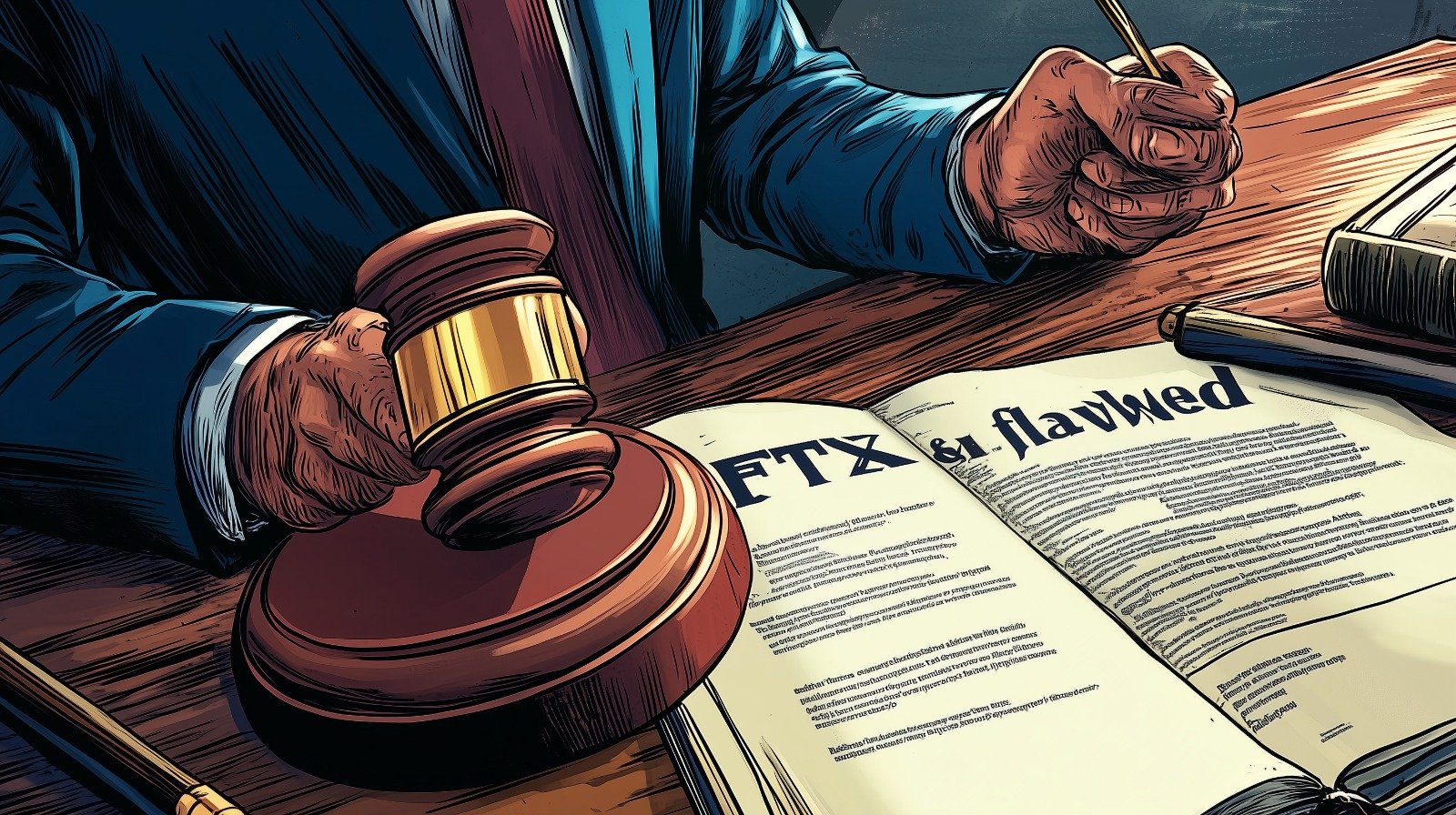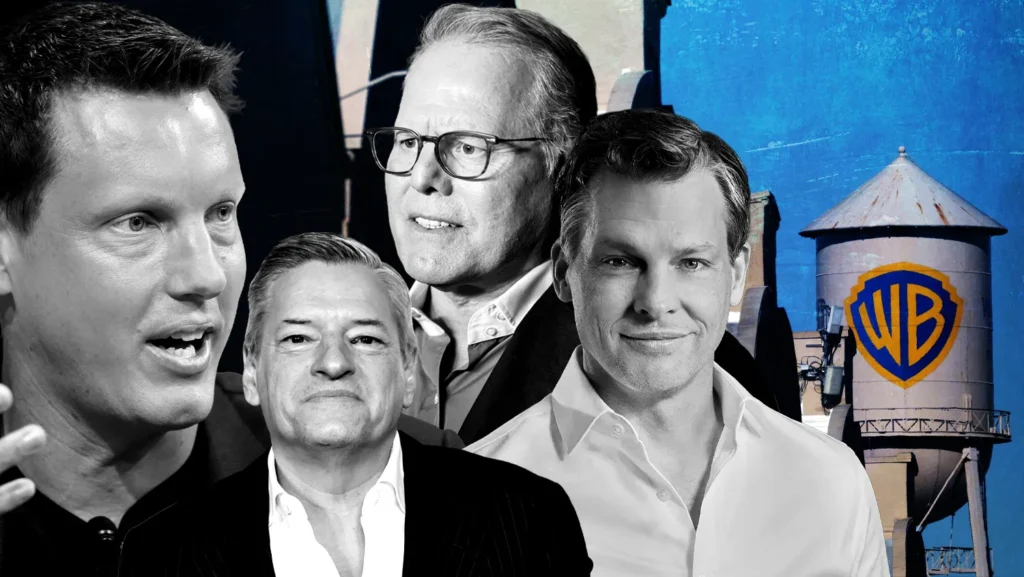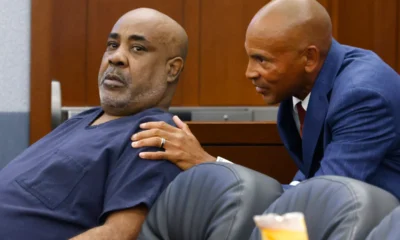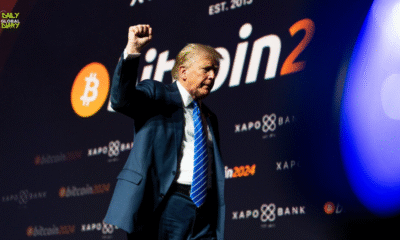Business
Fenwick says it is not to blame for FTX collapse denies being “key player” in Sam Bankman Fried fraud scheme
Law firm Fenwick & West
asked a judge to dismiss an updated lawsuit accusing it of helping FTX
mastermind one of the biggest financial frauds in crypto history.

The legal fallout from the spectacular collapse of FTX continues to grow, and this time the spotlight is on one of the law firms that once advised the disgraced exchange.
ALSO READ : Play Solana to launch handheld PSG1 in October with crypto wallet inside fans say it could be the ‘Nintendo Switch of Web3’
Fenwick & West, a prominent Silicon Valley law firm, has asked a Florida federal judge to throw out an updated class-action lawsuit that claims the firm played a “key and crucial role” in enabling the multibillion-dollar fraud at FTX.
The plaintiffs, a group of former FTX customers, allege that Fenwick provided legal advice and structures that helped Sam Bankman-Fried and his executives conceal the misuse of customer funds. But Fenwick says the claims are baseless, untimely, and rely on information that has been “stale for years.”
Fenwick insists it only gave “routine” legal services
In its filing on Monday, Fenwick argued that the updated lawsuit unfairly paints ordinary legal services as complicity in fraud.
“Fenwick is not liable for aiding and abetting a fraud it knew nothing about, based solely on allegations that Fenwick did what law firms do every day — provide routine and lawful legal services to their clients,” the firm stated.
The law firm also pushed back against suggestions that testimony from Nishad Singh, FTX’s former lead engineer, proved it was aware of wrongdoing. Fenwick said Singh only acknowledged that the firm advised on structuring founder loans, something it described as “common in closely held companies.”
“Mirror image” of earlier claims against another law firm
Fenwick further noted that the new allegations look strikingly similar to earlier accusations made against Sullivan & Cromwell, another high-profile law firm that had worked with FTX. Those claims were later dropped after a report concluded Sullivan had no knowledge of the fraud.
“They offer no credible reason why the same allegations should survive against Fenwick,” the firm argued, calling the case misleading and futile.
Securities law allegations called “far-fetched”
The updated complaint also accuses Fenwick of violating state securities laws in Florida and California by allegedly helping to launch and promote the FTX Token (FTT). But the firm says those claims are “frivolous” and were filed far too late.
“This is an eleventh-hour attempt to evade the Court’s ruling on the Celebrity Defendants’ motion to dismiss, and to recast lawyers as ‘promoters,’” Fenwick said, referencing lawsuits that targeted celebrities such as Tom Brady, Gisele Bündchen, and others who endorsed FTX.
Context: fallout from the FTX empire
The collapse of FTX in late 2022 remains one of the largest financial scandals in crypto history, wiping out billions in customer funds and sparking a wave of lawsuits. Its founder, Sam Bankman-Fried, was later convicted of fraud and sentenced in 2024.
Dozens of lawsuits have been filed against companies, celebrities, and professionals who had ties to the exchange. But law firms like Fenwick argue they should not be scapegoated simply because they provided legal services to a client that turned out to be fraudulent.
As the legal wrangling continues, the case against Fenwick could set an important precedent for how much responsibility law firms bear when their clients engage in fraud behind closed doors.
Business
What’s Still Open on Christmas Eve 2025? The Stores, Restaurants and Major Chains Americans Are Rushing To
From last-minute groceries to fast food fixes and gift shopping, here’s who’s open on December 24 — and who’s closing early

Christmas Eve has quietly become one of America’s busiest shopping and dining days. As millions prepare for December 25 celebrations, another holiday ritual unfolds — the last-minute dash for groceries, gifts, prescriptions, or a quick bite before stores shutter early.
In 2025, most major retailers, grocery chains, and restaurants are open on Christmas Eve, though many are operating on reduced or special hours. Planning ahead matters, especially as closing times vary widely by location.
Here’s a clear, category-by-category breakdown of what’s open on December 24, 2025, across the U.S.
Grocery Stores Open on Christmas Eve 2025
If you’re missing ingredients for dinner or dessert, these grocery chains are welcoming customers — but not all day.
- Aldi — Open, most locations closing around 4 p.m.
- Food Lion — Open until 7 p.m.; pharmacies from 9 a.m. to 3 p.m.
- Stop & Shop — Open until 6 p.m.
- Trader Joe’s — Open, closing at 5 p.m.
- Wegmans — Closing at 6 p.m.
- Whole Foods — Regular opening, closing at 7 p.m.
Tip: Many stores stop restocking shelves hours before closing — earlier visits are safer.
Drugstores Open on Christmas Eve
Pharmacies remain essential stops for holiday travelers and families.
- CVS Pharmacy — Open, though hours vary by location
- Walgreens — Open; pharmacy hours may differ from retail hours
Fast-Food Chains & Restaurants Open on Christmas Eve
Hungry during the holiday scramble? You have options.
- Applebee’s — Select locations open
- Chick‑fil‑A — Open Christmas Eve (closed Dec 25)
- Burger King — Open at most locations
- Dunkin’ — Open, hours vary
- IHOP — Open
- McDonald’s — Open, location-based hours
- Taco Bell — Open
- Starbucks — Many stores open, reduced hours
Domino’s stores are not required to open — customers should check local listings.

Mail, USPS, UPS: Are Deliveries Running?
Yes — with exceptions.
- United States Postal Service locations are open
- Mail delivery runs except Priority Mail Express
- Blue collection boxes will be picked up December 24
- UPS will deliver packages, though pickup schedules vary
Last-Minute Gift Shopping: Retailers Open on Christmas Eve
Most major retailers are open — but many close early.
- Best Buy — 8 a.m. to 7 p.m.
- Costco — Open
- Dollar General — Many open until 10 p.m.
- Home Depot — Closing at 5 p.m.
- HomeGoods, Marshalls, T.J. Maxx, Sierra — 7 a.m. to 6 p.m.
- IKEA — Closing early (varies by location)
- JCPenney — Opens 9 a.m., closing varies
- Kohl’s — 7 a.m. to 7 p.m.
- Macy’s — 8 a.m. to 7 p.m.
- Michaels — 7 a.m. to 6 p.m.
- Petco — Most close at 7 p.m.
- Target — 7 a.m. to 8 p.m.
- Walmart — 6 a.m. to 6 p.m.
Is the Stock Market Open on Christmas Eve?
Yes — but only for a short session.
U.S. stock markets are open on December 24, closing early at 1 p.m. ET, instead of the usual 4 p.m.
The Bottom Line
Christmas Eve 2025 remains one of the most active retail days of the year — but timing is everything. Many stores close earlier than usual, and some services scale back well before evening.
If you’re heading out on December 24, check local hours first, plan efficiently, and don’t wait until nightfall — the doors may already be locked.
For more Update- DAILY GLOBAL DIARY
Business
Netflix Chiefs Walk the Warner Bros. Lot… A Power Move After Paramount Skydance’s Bid Is Rejected
As Warner Bros. Discovery shuts the door on Paramount Skydance, David Zaslav rolls out the red carpet for Netflix’s Ted Sarandos and Greg Peters

In Hollywood, timing is rarely accidental — and neither are photo ops.
On the very same day that Warner Bros. Discovery’s board officially rejected Paramount Skydance’s hostile bid, WBD CEO David Zaslav made a conspicuously public statement about where his company’s future may be headed.
Zaslav welcomed Netflix co-CEOs Ted Sarandos and Greg Peters to the iconic Warner Bros. Studio lot in Burbank — a visit documented through a series of carefully released images that quickly caught the industry’s attention.
The message was subtle in tone but loud in implication.
A Walk Through Hollywood History
Photos released by WBD on Wednesday show Zaslav strolling alongside Sarandos and Peters across the legendary studio grounds, including a stop in front of the instantly recognizable Warner Bros. Water Tower — a symbol of nearly a century of film and television history.
Officially, the visit was described as a meeting between Netflix leadership and executives at the studio. Unofficially, it read as a public endorsement of Netflix’s vision — and perhaps, its wallet.
ALSO READ : Taylor Swift Quietly Changes Lyrics to Two Reputation Songs on Apple Music, Swifties Go Into Detective Mode
Just weeks earlier, on December 5, Netflix had its $82.7 billion bid for WBD’s streaming and studios division accepted. That division includes crown-jewel assets such as Warner Bros. Pictures, HBO, HBO Max, and DC Studios.
Why the Paramount Skydance Bid Fell Flat
Earlier that same day, WBD’s board formally rejected the hostile takeover attempt from Paramount Global and Skydance Media — a move that insiders say reflected both strategic concerns and cultural misalignment.
While Paramount Skydance’s offer aimed to consolidate legacy media power, Netflix’s proposal centers squarely on streaming dominance, global scale, and technology-driven growth — areas where the streamer has already proven its reach.
By opening the gates of the Warner Bros. lot to Netflix’s top brass, Zaslav appeared to signal not just preference, but confidence in where the deal is heading.
A Not-So-Quiet Signal to Hollywood
Hollywood executives are well aware that studio tours are rarely casual affairs. Allowing Sarandos and Peters to be photographed on the lot — especially amid active acquisition talks — sends a clear signal to investors, talent, and competitors alike.

It suggests continuity rather than disruption. Legacy rather than liquidation.
Netflix, long viewed as the industry disruptor, has increasingly positioned itself as a studio caretaker, not just a streaming platform. The Warner Bros. assets would give Netflix unprecedented access to intellectual property, prestige brands, and theatrical infrastructure.
For Zaslav, the optics matter. In an industry still grappling with streaming losses, debt pressure, and shifting audience habits, stability — or at least the appearance of it — can be as valuable as the deal itself.
What Happens Next
While regulatory approvals and shareholder reactions still loom, the visit underscores a reality that few in Hollywood now ignore: the battle for the future of legacy studios is being fought not behind closed doors, but in plain sight.
And sometimes, a walk past a water tower says more than a press release ever could.
Business
From DVSA to AI fleets… key leadership moves reshaping transport, automotive and tech sectors this week
New appointments at DVSA, Aion Auto, Microlise, Leasing Options, Motive, and GRS Fleet Graphics signal a busy end to 2025 for industry leadership

It has been a decisive week for leadership across the UK’s transport, automotive, logistics and AI technology sectors, with a series of high-profile appointments aimed at tackling long-standing challenges and preparing businesses for rapid growth in 2026.
From clearing driving test backlogs to launching new car brands and scaling AI-powered fleet platforms, these moves underline how talent and experience are becoming central to operational reform.
New DVSA chief tasked with tackling driving test backlog
The Driver and Vehicle Standards Agency (DVSA) has confirmed Beverley Warmington as its new Chief Executive, effective January 5, 2026. She takes over from Loveday Ryder, who has led the agency since 2021.
Warmington arrives at a critical moment, with learner drivers across the UK facing prolonged test waiting times that have affected employment and mobility. She brings nearly 20 years of public service experience, most recently as Area Director for London, Essex and Eastern England at the Department for Work and Pensions (DWP), where she oversaw operations involving more than 12,000 staff.
UK Roads and Buses Minister Simon Lightwood praised the appointment, saying Warmington has the operational leadership needed to “grip the driving test backlog” and ensure reforms translate into faster, safer access to driving tests.
Aion Auto strengthens UK launch plans with senior marketing hire
As Aion Auto gears up for its UK market entry in 2026, the brand has appointed Alex Key as Marketing Director, reporting directly to Managing Director Jon Wakefield.
Key brings more than two decades of automotive marketing experience, having previously held senior roles at Honda, BMW Group, MINI, and Suzuki GB. Her recent work included helping steer Suzuki through a major rebrand and its first electric vehicle launch.
Wakefield said her ability to shape brand identity will be “pivotal” as Aion prepares to introduce itself to UK consumers in an increasingly competitive EV market.
Microlise appoints new CTO to drive logistics innovation
Transport technology specialist Microlise has named Dean Garvey-North as its new Chief Technology Officer, succeeding Duncan McCreadie, who retires after a decade with the company.
Garvey-North brings senior digital leadership experience from the utilities sector and management consultancy. He is also a member of Gartner’s CIO community and a contributor to the Forbes CIO Technology Council.
Microlise CEO Nadeem Raza said the appointment reinforces the company’s ambition to remain the UK’s most trusted name in transport technology, particularly as logistics firms push for efficiency, sustainability and smarter data-driven operations.

Leasing Options promotes Danielle Jones to head of marketing
Manchester-based vehicle leasing firm Leasing Options has promoted Danielle Jones to Head of Marketing, recognising her role in a major transformation of the brand’s digital and customer strategy.
Since joining in 2024, Jones has led a rebrand, rolled out new TV and audio campaigns, and overhauled email marketing with redesigned customer journeys. In her expanded role, she will oversee all marketing, lead generation, social media and PR activity.
Chief Operating Officer Mike Thompson described the promotion as a “natural next step” aligned with the company’s long-term growth ambitions.
Motive adds AI heavyweight to board
AI-powered operations platform Motive has appointed Adeyemi Ajao to its Board of Directors, strengthening its leadership as it scales internationally.
Ajao is the co-founder and managing partner of Base10 Partners, a venture capital firm focused on technology transforming the real economy. Motive CEO Shoaib Makani said Ajao’s experience as a founder and investor will help translate AI innovation into durable enterprise value.
GRS Fleet Graphics appoints operating partner to support growth
GRS Fleet Graphics has appointed James Hopkins as Operating Partner, a move designed to strengthen operational capability across both GRS and Epic Media Group.
Hopkins brings extensive experience across automotive operations, fleet management, telematics and B2B services. General Manager Martin Tyrrell said his leadership will be key as the business continues to scale and serve mid-size and large fleets across public and private sectors.
A clear trend heading into 2026
Taken together, these appointments point to a wider trend: organisations across transport, automotive and logistics are investing heavily in experienced leadership to modernise services, deploy AI, and improve customer outcomes.
As 2026 approaches, these executives will be under close watch — not just for strategy, but for execution.
For more Update – DAILY GLOBAL DIARY
-

 Entertainment1 week ago
Entertainment1 week agoHe-Man Wears a Suit Now… Nicholas Galitzine’s ‘Masters of the Universe’ Trailer Drops a Shock Fans Didn’t See Coming
-

 Entertainment1 week ago
Entertainment1 week agoBrazil Eyes Oscar History Again… ‘The Secret Agent’ Scores Best Picture Nomination as Wagner Moura Stuns Hollywood
-

 Entertainment6 days ago
Entertainment6 days ago“Comedy Needs Courage Again…”: Judd Apatow Opens Up on Mel Brooks, Talking to Rob Reiner, and Why Studio Laughs Have Vanished
-

 Entertainment1 week ago
Entertainment1 week agoOscars Go Global in a Big Way as This Year’s Nominations Signal a New Era: ‘The Academy Is Finally Looking Beyond Hollywood…’
-

 Entertainment1 week ago
Entertainment1 week ago“Dangerously Kinky… and Darkly Funny”: Olivia Wilde and Cooper Hoffman Push Boundaries in ‘I Want Your Sex’
-

 Sports1 week ago
Sports1 week agoA Strong Night for Caleb Williams Ends With Doubts About the Bears’ Late Decisions
-

 Crime6 days ago
Crime6 days agoMan Accused in Tupac Shakur Killing Asks Judge to Exclude Critical Evidence
-

 Politics1 week ago
Politics1 week agoWhy Bari Weiss Says Pulling a ‘60 Minutes’ Story Was the Right Call — Even If It Looked Radical





















